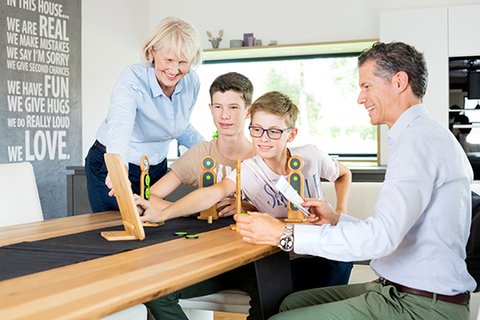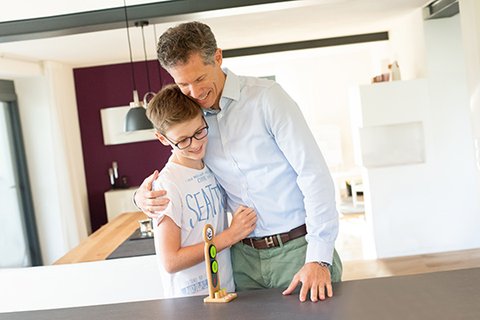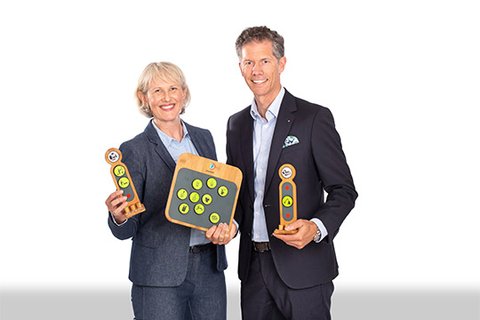29 October 2018
easyfaM reinvents teamwork in the family new!
The easyfaM founders brought agile and lean work methods from the business world to their family's home - since then the family organisation has been running by itself! Under the name easyfaM they pass on their knowledge to other families.

As experienced managers in international companies, Heidi and Christian Eineder know proven management methods inside out. One day, together with their two lively boys, they discovered the potential of using the business methods to better structure their family tasks and make their everyday lives easier. With easyfaM, the Eineder family provides other families with tools that ensure more attentiveness, transparency and fairness in family organisation.
What does teamwork in a family mean?
The ability to work in a team is one of the core competencies in today's working world. With easyfaM, children and young people develop the ability to work in a team in a playful way. The tools take the parents out of the "line of fire", because all family members organize themselves more freely in the decision, in the timing and more reliably in the conversion.
There is no need to plan the housework, which is done automatically. With the new team spirit, the family gains more free time, which can be spent together and more valuable than before. Parents do not have to delegate tasks at the moment they are thinking about them, because they are all already clearly communicated and there is no need for constant enquiries.
What do families say who have already tested the easyfaM Taskboard?
Kirsten (doctor) and Lutz M. (Dipl.-Ing.) are highly satisfied with the new organization, even though the housework is admittedly still no longer fun. The easyfaM Taskboard has changed many things in their family for the better. The three children find it good not to always do the same tasks and to see what the others are doing. Furthermore, no one has to remind the other - everyone thinks of their tasks with the help of the taskboard. Kirsten adds that "the easyfaM board structures and motivates the family members through visualisation, and there is an unspoken mutual motivation. It helps our family a lot in everyday life and significantly reduces the potential for conflict."
During the weekly check, the family goes through what went well and not so well in a short conversation. This works excellently because there is no acute topic of dispute, but a detached atmosphere in which everyone proudly presents their completed tasks, according to the parents. With the routines learned in the process, children learn to accept rules, become independent and gradually assume responsibility in the family.
The enthusiastic parents Veronika (teacher) and Tobias Schmid (Lean Manager) realize that they themselves were much more motivated to reliably complete their daily and weekly tasks. "The system works because the parents naturally want to live up to their role model role towards the children," reports Heidi Eineder, who repeatedly visited the families during the test phase of the easyfaM Taskboard.
Who determines which tasks are completed when?
With the help of the easyfaM Taskboard, each family member decides for himself when to complete his tasks. This is because there is a lot of conflict in families when parents call for help "now" and interrupt their child at something that seems more important at that moment (e.g. playing the game to its end). If the child can determine the time for the completion, the household succeeds "noiselessly". The easyfaM Taskboard (based on an Agile method from the business environment) visualises all the regular tasks in the household. An example: By Saturday evening, each family member has covered their three red "to do" points with green task coins when they are done. The earlier the family members choose a task, the easier or more interesting is the selection of household tasks - a very motivating effect, especially for children. "Children love brain candies because their brains are particularly good at taking pictures," explains Christian Eineder.
In addition, with the easyfaM Taskboard, repetitive daily activities can be individually displayed every day - in the foot of the figures. This gives parents a wonderful overview of the activities without giving the other family members the feeling of control.
easyfaM also provides solutions for changed family structures
When a family member travels or falls ill, the tasks are compensated by teamwork within the family. "This is where things quickly develop as a matter of course," says Christian Eineder from experience. "However, if someone wants to avoid the team, the group quickly reminds them of their responsibility towards the team. The group dynamics created by the use of the easyfaM taskboard support each individual in reliably completing their tasks.
All participants perceive how important each member is for the completion of the teamwork. The easyfaM Taskboard brings joy to children and adults in common results, shows the work status transparently at all times and lets everyone learn modern working methods in a playful way. The methodology works - with a gentle competitive character, a high degree of independence and the freedom of personal time management. Of course, any praise from the parents for independently completed tasks has a positive strengthening effect. What they achieve together strengthens the family bond, appreciation and the team spirit of the family.


